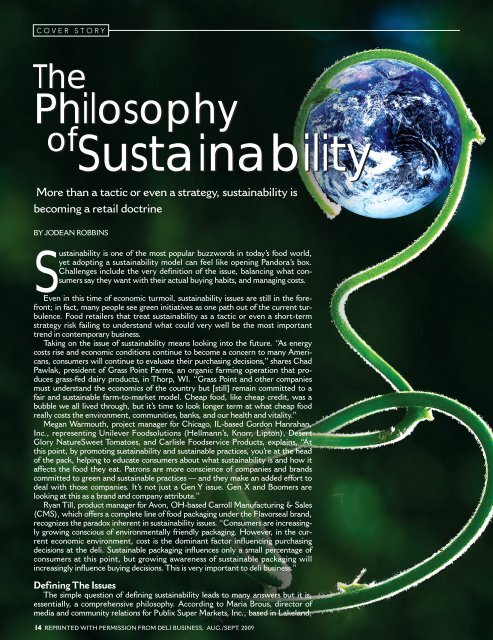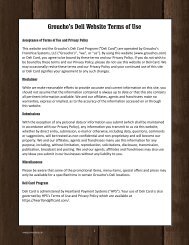Philosophy of Sustainability - Groucho's
Philosophy of Sustainability - Groucho's
Philosophy of Sustainability - Groucho's
You also want an ePaper? Increase the reach of your titles
YUMPU automatically turns print PDFs into web optimized ePapers that Google loves.
C O V E R<br />
S T O R Y<br />
The<br />
<strong>Philosophy</strong><br />
<strong>of</strong> <strong>Sustainability</strong><br />
More than a tactic or even a strategy, sustainability is<br />
becoming a retail doctrine<br />
BY JODEAN ROBBINS<br />
<strong>Sustainability</strong> is one <strong>of</strong> the most popular buzzwords in today’s food world,<br />
yet adopting a sustainability model can feel like opening Pandora’s box.<br />
Challenges include the very definition <strong>of</strong> the issue, balancing what consumers<br />
say they want with their actual buying habits, and managing costs.<br />
Even in this time <strong>of</strong> economic turmoil, sustainability issues are still in the forefront;<br />
in fact, many people see green initiatives as one path out <strong>of</strong> the current turbulence.<br />
Food retailers that treat sustainability as a tactic or even a short-term<br />
strategy risk failing to understand what could very well be the most important<br />
trend in contemporary business.<br />
Taking on the issue <strong>of</strong> sustainability means looking into the future. “As energy<br />
costs rise and economic conditions continue to become a concern to many Americans,<br />
consumers will continue to evaluate their purchasing decisions,” shares Chad<br />
Pawlak, president <strong>of</strong> Grass Point Farms, an organic farming operation that produces<br />
grass-fed dairy products, in Thorp, WI. “Grass Point and other companies<br />
must understand the economics <strong>of</strong> the country but [still] remain committed to a<br />
fair and sustainable farm-to-market model. Cheap food, like cheap credit, was a<br />
bubble we all lived through, but it’s time to look longer term at what cheap food<br />
really costs the environment, communities, banks, and our health and vitality.”<br />
Megan Warmouth, project manager for Chicago, IL-based Gordon Hanrahan,<br />
Inc., representing Unilever Foodsolutions (Hellmann’s, Knorr, Lipton), Desert<br />
Glory NatureSweet Tomatoes, and Carlisle Foodservice Products, explains, “At<br />
this point, by promoting sustainability and sustainable practices, you’re at the head<br />
<strong>of</strong> the pack, helping to educate consumers about what sustainability is and how it<br />
affects the food they eat. Patrons are more conscience <strong>of</strong> companies and brands<br />
committed to green and sustainable practices — and they make an added effort to<br />
deal with those companies. It’s not just a Gen Y issue. Gen X and Boomers are<br />
looking at this as a brand and company attribute.”<br />
Ryan Till, product manager for Avon, OH-based Carroll Manufacturing & Sales<br />
(CMS), which <strong>of</strong>fers a complete line <strong>of</strong> food packaging under the Flavorseal brand,<br />
recognizes the paradox inherent in sustainability issues. “Consumers are increasingly<br />
growing conscious <strong>of</strong> environmentally friendly packaging. However, in the current<br />
economic environment, cost is the dominant factor influencing purchasing<br />
decisions at the deli. Sustainable packaging influences only a small percentage <strong>of</strong><br />
consumers at this point, but growing awareness <strong>of</strong> sustainable packaging will<br />
increasingly influence buying decisions. This is very important to deli business.”<br />
Defining The Issues<br />
The simple question <strong>of</strong> defining sustainability leads to many answers but it is,<br />
essentially, a comprehensive philosophy. According to Maria Brous, director <strong>of</strong><br />
media and community relations for Publix Super Markets, Inc., based in Lakeland,<br />
14 REPRINTED WITH PERMISSION FROM DELI BUSINESS, AUG./SEPT. 2009
C O V E R<br />
S T O R Y<br />
FL, “<strong>Sustainability</strong> means balancing the<br />
needs <strong>of</strong> humanity with the needs <strong>of</strong> the living<br />
earth. It’s meeting today’s demands without<br />
compromising what‘s essential for<br />
tomorrow. That’s why Publix got into a<br />
Green Routine in 2001 — long before being<br />
eco-savvy was chic. We started making<br />
smarter choices to enrich the quality <strong>of</strong> life <strong>of</strong><br />
our associates, our customers and our planet.”<br />
“We view sustainability in multiple parts,”<br />
explains Bruce Miller, president <strong>of</strong> Groucho’s<br />
Franchise Systems in Columbia, SC. The<br />
company owns, operates and franchises 21<br />
Groucho’s Deli units, having evolved from a<br />
purely retail deli to mostly foodservice<br />
restaurants. “Part <strong>of</strong> it has to do with the<br />
quality <strong>of</strong> the product we serve. This has<br />
worked for multiple, multiple generations and<br />
hopefully will continue — and for us that’s<br />
sustainable. Then you have the external<br />
environmental things such as wax paper and<br />
plates. When we view product change, we<br />
take a comprehensive view from customer<br />
perception to quality to cost impacts to the<br />
impact on our legacy.”<br />
Some focus mainly on the environmental<br />
aspect. “<strong>Sustainability</strong> is responsible packaging,”says<br />
CMS’Till. “This means responsibility<br />
in terms <strong>of</strong> the effect it has on our environment,<br />
using less energy getting packaging to<br />
market, monitoring the creation <strong>of</strong> waste,<br />
and increasing safety for consumers throughout<br />
the life cycle <strong>of</strong> the product.<br />
“Look at using less packaging to get product<br />
to market, such as fewer overwraps,<br />
thinner plastics, etc. Packaging life cycle is<br />
another area,” he continues. “The deli will<br />
progress into the sustainable mind-sets with<br />
more recyclable or reusable packaging<br />
options. Finally, packaging responsibility plays<br />
a role when the deli demands environmentally<br />
responsible barrier resins to keep their products<br />
fresh. Certain types <strong>of</strong> oxygen barrier<br />
resins cannot be recycled, or their production<br />
may cause negative environmental effects.”<br />
Others link sustainability to a comprehensive<br />
resource and production view. “To our<br />
organization, sustainability means managing<br />
our resources wisely,” reports Hanna Sjolund,<br />
marketing manager for InnoWare, Inc. in<br />
Alpharetta, GA. “We do this by using recycled<br />
materials, by designing our packaging to<br />
reduce the amount <strong>of</strong> plastic and, wherever<br />
possible, using raw materials from annually<br />
renewable resources that also can be composted.<br />
Our Eco line <strong>of</strong> packaging helps to<br />
decrease fossil fuel use and lower greenhouse<br />
emissions when compared to the production<br />
<strong>of</strong> traditional plastics.”<br />
“We define sustainability as the ability to<br />
utilize resources at a rate and in a way not<br />
negatively impacting the environment, health<br />
<strong>of</strong> the cows or the prosperity <strong>of</strong> the family<br />
farmer,” explains Grass Point’s Pawlak. “We<br />
go further by producing a product with a scientific<br />
increase in naturally occurring health<br />
attributes and a richer, creamier flavor as a<br />
result <strong>of</strong> diets rich in grasses/pastures.”<br />
But as with many environmental and<br />
social issues, sincerity is the root <strong>of</strong> success<br />
for a sustainability program. “Customers will<br />
expect a sincere approach to improve the<br />
environment, use <strong>of</strong> energy, use <strong>of</strong> raw<br />
materials, etc. and thus sustain it for future<br />
generations,” cautions Brous. “As with food<br />
safety, sustainability should be viewed not as<br />
a competitive tactic but as a social responsibility<br />
for everyone.”<br />
“TO OUR ORGANIZATION,<br />
SUSTAINABILITY MEANS<br />
MANAGING OUR<br />
RESOURCES WISELY.”<br />
— HANNA SJOLUND<br />
INNOWARE, INC.<br />
Putting It To Practice<br />
<strong>Sustainability</strong> in the deli is an important<br />
issue because <strong>of</strong> the high percentage <strong>of</strong> takeout<br />
containers used. Yet operators report<br />
great results with just small steps. “Using<br />
recycled paper, biodegradable packaging or<br />
energy efficient equipment can make a big<br />
impact and consumers notice these,” Hanrahan’s<br />
Warmouth explains.<br />
Brous reports, “At the Publix Deli, we<br />
focus on the following three issues in regards<br />
to sustainability: emphasis on domestic versus<br />
imported cheese; paper versus plastic<br />
where possible and still protect the quality <strong>of</strong><br />
the product; and we expect our suppliers to<br />
demonstrate sustainability efforts as well.”<br />
Deli operators large and small are already<br />
implementing unique and easy changes.<br />
“Groucho’s has taken a proactive approach<br />
to reducing our carbon footprint,” says Miller.<br />
“Most recently we got rid <strong>of</strong> our Styr<strong>of</strong>oam<br />
plates, switching to wax paper and baskets.<br />
We reduced our waste about 33 percent<br />
system-wide.<br />
“Our cup and to-go box manufacturers<br />
that are still using Styr<strong>of</strong>oam have made proactive<br />
steps to maximize efficiency, promote<br />
environmental attributes and develop new<br />
products,” he continues. “Our cup manufacturer<br />
has provided us with material explaining<br />
how making foam cups creates less waste<br />
than plastic-lined paper cups because it uses<br />
less energy to produce, it doesn’t hurt the<br />
ozone layer, and it’s 90 percent air.<br />
Groucho’s also uses a dishwashing system<br />
called OptiFill as a component <strong>of</strong> its sustainability<br />
initiative. “OptiFill automatically<br />
dilutes the concentrate according to the<br />
amount <strong>of</strong> water dispensed through the system,”<br />
according to Deric Rosenbaum, president<br />
<strong>of</strong> Franchise Consulting and Services<br />
Corp., Columbia, SC, which manages and<br />
launches new Groucho’s Deli units and is<br />
also a franchise owner. “This not only prevents<br />
chemical waste, but it also reduces the<br />
amount <strong>of</strong> transportation required to ship<br />
the product. This means zero product waste<br />
as well as not putting excess chemicals into<br />
the sewer systems.”<br />
Operators are cautioned to look at the<br />
entire life cycle <strong>of</strong> a product to make good<br />
decisions regarding sustainable practices.<br />
“Paper is not always eco friendly,” warns<br />
InnoWare’s Sjolund. “You cannot recycle<br />
paper with plastic coating. Look for BPIapproved<br />
[Biodegradable Products Institute]<br />
packaging meeting the ASTM [American<br />
Society for Testing and Material] standard for<br />
compostability. Look at the whole life cycle <strong>of</strong><br />
the package. Where is it made? Is it made<br />
from a sustainable material thereby reducing<br />
fossil fuel use and greenhouse gas emissions?<br />
What is the end <strong>of</strong> life <strong>of</strong> this package? Since<br />
most packaging ends up in landfills rather than<br />
going back into the recycling stream, we recommend<br />
deli operators look at how the package<br />
is made rather than focusing on the end<strong>of</strong>-life<br />
aspect where we have little control.”<br />
Franchise Consulting’s Rosenbaum adds,<br />
“We’ve looked at many options like compostable<br />
containers, paper cups, etc., but<br />
many <strong>of</strong> them are just not cost effective in<br />
any way, shape or form. And, how many<br />
people go home at end <strong>of</strong> the day with a<br />
compostable to-go box or dinnerware and<br />
actually take it to a composting facility?<br />
They don’t, they put it in their trash and it<br />
goes to a municipal trash dump.”<br />
Small changes in packaging can reap big<br />
benefits. “Going to the Groucho’s branded<br />
wax paper on a natural product printed with<br />
soy ink was a natural step and it has really<br />
reduced the carbon footprint in the amount <strong>of</strong><br />
aggregate trash we produce at the end <strong>of</strong> the<br />
day for all <strong>of</strong> our units,”explains Rosenbaum.<br />
Support From All Sides<br />
The deli cannot stand alone in this issue.<br />
“A department cannot address this matter<br />
independent <strong>of</strong> the rest <strong>of</strong> the company,”<br />
cautions Publix’s Brous. “There must be a<br />
clear stance by the company with a tangible<br />
halo effect over each area <strong>of</strong> operations.”<br />
Many manufacturers in the deli arena<br />
have established corporate and brand sustainability<br />
initiatives and provide support to<br />
their deli customers. “Carlisle Foodservice<br />
Products has many items helping back <strong>of</strong><br />
house with waste and water management<br />
and efficiency,” says Warmouth. “Desert<br />
Glory NatureSweet Tomatoes has established<br />
an environmentally sound process <strong>of</strong><br />
production from soil to shipment. Unilever,<br />
16 REPRINTED WITH PERMISSION FROM DELI BUSINESS, AUG./SEPT. 2009
and its foodservice branch, Unilever Foodsolutions,<br />
has developed a global sustainability<br />
initiative ranging from <strong>of</strong>fice practices to the<br />
certification <strong>of</strong> its entire tea category, Lipton,<br />
by the Rainforest Alliance by 2015. The<br />
Rainforest Alliance ensures ethical and sustainable<br />
practices within the communities<br />
where Lipton Teas are grown.”<br />
“A lot <strong>of</strong> everything we do and every<br />
decision we make back here at the corporate<br />
<strong>of</strong>fice is based on the tradition <strong>of</strong> how my<br />
grandfather believed in quality as the most<br />
important ingredient in a sandwich,” Groucho’s<br />
Miller explains. “He believed in giving<br />
back to the community and looking out for<br />
your community and this is what we preach<br />
to each new franchise in each new location<br />
we open. So something like switching over<br />
to wax paper from foam plates is actually in<br />
the tradition <strong>of</strong> my granddad — doing what’s<br />
good for the community without being asked<br />
to do it. Just doing it because you know<br />
what’s right.”<br />
What CanYou Do?<br />
The most important first — and continuing<br />
— step for deli operators is to engage the<br />
concept. “Do not ignore the issue,” advises<br />
Publix’s Brous. “Seek to understand how to<br />
promote sustainability in a tangible, clearly<br />
defined way.”<br />
Promoting your commitment to sustainability<br />
will help consumers who are looking<br />
to make the commitment as well. “Operators<br />
can promote their deli as the consumer<br />
champion for sustainability issues,” says<br />
CMS’s Till. “If a retailer promotes sustainability<br />
as one <strong>of</strong> its core beliefs, it will attract<br />
consumers sharing the same beliefs. When<br />
consumers trust the retailer to be environmentally<br />
conscious, the consumer doesn’t<br />
have to make purchasing decisions based on<br />
packaging because the retailer has already<br />
worked to <strong>of</strong>fer the most responsible packaging<br />
option for them.”<br />
Development <strong>of</strong> a logo or indicator to<br />
help customers quickly identify a sustainable<br />
item is a productive option. “We encourage<br />
our customers to emboss or label their<br />
packaging as environmentally friendly,” says<br />
InnoWare’s Sjolund. “This helps consumers<br />
understand the package is from a sustainable<br />
resource. The logo can be placed on the deli<br />
menu or next to product signage in the deli<br />
case. Also, make the information available to<br />
customers through flyers, posters, case<br />
clings, etc. to help educate why sustainability<br />
is important to the deli and to the customers<br />
themselves.<br />
“Our research has proven to us that consumers<br />
want sustainable, healthful and environmentally<br />
sound products,” she continues.<br />
“They’re willing to pay a little more if they<br />
believe they’re helping to support a better<br />
C O V E R S T O R Y<br />
environment, and operators should use packaging<br />
making it easier for consumers to make<br />
these choices. A clear/clear PLA clamshell<br />
resembling regular plastic does not, in itself,<br />
get the consumer’s attention. Tell the story<br />
by using packaging with a distinct color, an<br />
embossed lid, or by labeling, which makes its<br />
eco-friendliness stand out. Our Eco line <strong>of</strong><br />
packaging features an earth-toned base that<br />
helps operators convey a green message<br />
to their end users.”<br />
Customer outreach is another important<br />
component <strong>of</strong> any initiative. “Let customers<br />
know about your department’s or company’s<br />
commitment to green and sustainable practices,”<br />
advises Gordon Hanrahan’s Warmouth.<br />
“If the store or department has special<br />
practices such as new low-energy refrigerated<br />
units, etc., tout those. <strong>Sustainability</strong><br />
goes beyond recycling and involves several<br />
aspects, including packaging, sourcing and<br />
production. Deli operators need not focus<br />
only on their own sustainability efforts, but<br />
on those <strong>of</strong> the products they use and sell.”<br />
Grass Point’s Pawlek advocates a blend <strong>of</strong><br />
technology and tried-and-true methods to<br />
get the message out to consumers. “In-store<br />
demos have worked historically, but more<br />
progressive operators are using social media<br />
forums, flyers, and in-store ‘good-for-you’<br />
food tours hosted by in-store dieticians or<br />
other health pr<strong>of</strong>essions.”<br />
DB<br />
REPRINTED WITH PERMISSION FROM DELI BUSINESS, AUG./SEPT. 2009 17











